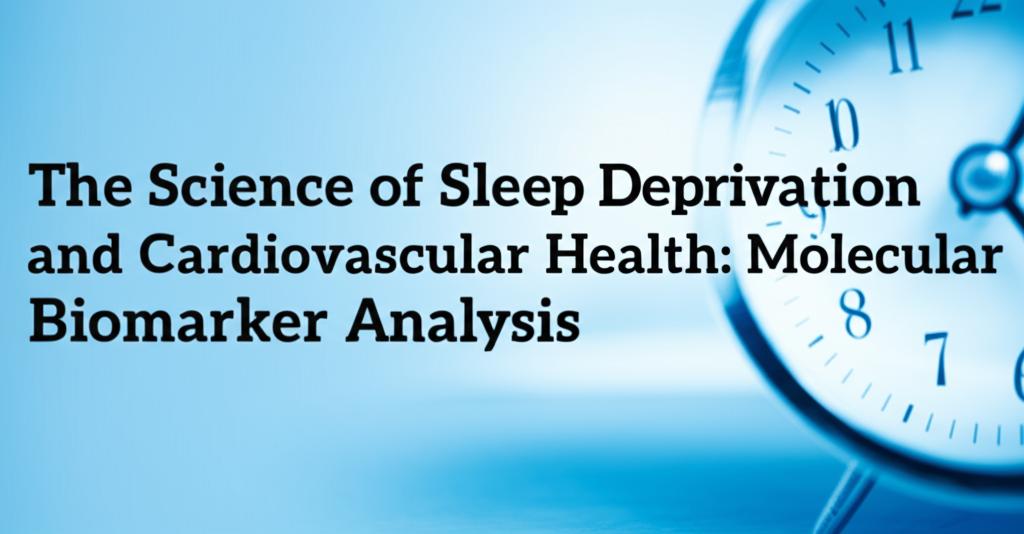Recent research underscores the critical link between sleep deprivation and cardiovascular health, with even short periods of insufficient sleep triggering molecular changes that elevate the risk of heart problems. These new findings offer a deeper understanding of how sleep loss impacts the cardiovascular system at the protein level and highlights potential avenues for early risk detection and intervention.
A key aspect of this emerging knowledge is the impact of sleep deprivation on specific blood biomarkers. Studies have shown that even a few nights of inadequate sleep can lead to an increase in pro-inflammatory proteins in the blood. These proteins are known to be involved in the development of heart failure and coronary artery disease by contributing to processes like endothelial dysfunction, the formation of arterial plaques, and increased stress on the heart muscle. This elevation of inflammatory markers suggests that even transient sleep loss can initiate early vascular changes, potentially increasing long-term cardiovascular risk.
Interestingly, these molecular shifts have been observed even in young, healthy individuals, indicating that the detrimental cardiovascular effects of sleep deprivation are not limited to older or already at-risk populations. This highlights the fundamental biological importance of consistent, healthy sleep habits from an early age.
The research also delves into the disruption of the body's internal molecular clock, or circadian rhythm, by sleep deprivation. This disruption can induce cellular stress responses, including endoplasmic reticulum stress and apoptosis (programmed cell death), which may impair cardiac function. This cellular stress is believed to activate inflammatory cascades, further increasing cardiovascular risk.
Furthermore, sleep deprivation has been shown to affect the autonomic nervous system, which regulates crucial functions like heart rate and blood pressure. An imbalance in this system, often leading to increased sympathetic nervous system activity, is associated with elevated heart rate, higher blood pressure, and an increased tendency for platelet aggregation, all of which are detrimental to cardiovascular health.
The interplay between sleep deprivation and physical exercise presents a more nuanced picture. While exercise can still elicit some protective cardiovascular responses even when sleep is compromised, research suggests that exercising under conditions of sleep deprivation might put additional strain on the heart's muscle cells. This could be due to altered metabolic or inflammatory signaling. Although physical activity can help mitigate some negative effects of poor sleep, it cannot fully replace the essential restorative functions of sleep.
From a clinical perspective, these insights are significant. The identified changes in circulating proteins and microRNAs following sleep deprivation show promise as early predictive biomarkers for cardiovascular disease. Tracking these molecular alterations could enable healthcare providers to intervene earlier, potentially before cardiovascular disease fully manifests. This opens doors for more personalized diagnostics and treatment strategies in cardiovascular care.
Ongoing research continues to unravel the complex molecular interactions between sleep and cardiovascular health. The development of biomarkers that can link habitual short sleep duration to adverse cardiometabolic risk is a key area of focus. These biomarkers could help clarify the biochemical mechanisms involved, identify new targets for interventions, and assist in pinpointing individuals who would most benefit from sleep-focused health strategies.
In summary, the latest scientific understanding emphasizes that sleep insufficiency is not merely a lifestyle inconvenience but a potent biological risk factor for cardiovascular disease. The analysis of molecular biomarkers reveals that sleep deprivation, even in the short term, can trigger inflammatory responses, disrupt circadian rhythms, and negatively impact autonomic nervous system function, all contributing to an increased risk of heart problems. This growing body of knowledge underscores the importance of prioritizing sleep for maintaining cardiovascular health throughout life.

